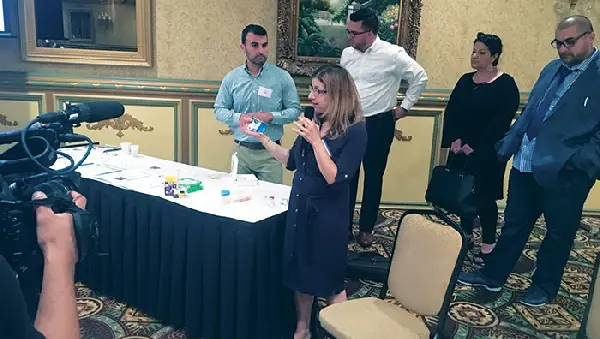
|
| Ghada Abdallah and other SAFE members lead a training seminar on Naloxone. |
DEARBORN — Local residents debuted the SAFE Substance Abuse Coalition earlier this year with an objective to alert the community about a rising epidemic that’s killing young adults.
And people seem to have gotten the memo.
In recent months, discussions have ensued at local mosques, schools and community centers to educate families about substance abuse.
On Thursday, July 14, SAFE took it one step further by providing an “overdose” training seminar at the Bint Jebail Cultural Center to local residents who could potentially save an addict’s life during his or her darkest hours.
Spearheaded by Executive Director Hassan Abdallah, local pharmacist Ghada Abdallah and Dr. Ali Dabaja, a physician at Beaumont Hospital, the seminar provided extensive training on Naloxone, a medication that can reverse the effects of an opioid overdose.
The medication is often used by injecting it into a person experiencing an overdose. It attaches to the same parts of the brain that receives heroin and other opioids and it blocks the opioids for up to 90 minutes to reverse the respiratory depression that could lead to death.
The drug can be accessible through a prescription; and in recent years, Emergency Response Units have carried them to intervene when someone appears to have overdosed.
However, Ghada Abdallah, a member of the Michigan Pharmacists Association Board, said the group is working on a measure to allow people to purchase the drug at local pharmacies without a prescription.
“It’s only available by prescription, but we are working on a bill to put it through the legislation in the House,” she said. “This way a person can walk up to the pharmacy and say, ‘I need one because my brother has a drug problem.'”
Two organizations— Bryan’s Hope and the Detroit-Wayne Mental Health Authority— donated more than 150 Naloxone kits to SAFE to distribute to local community members at the seminar.
Naloxone comes in two forms, a needle injection or a nasal spray. SAFE distributed it in the form of a nasal spray because people find it easier to administer.
During the training seminar, Dabaja noted that he routinely treats patients who have overdosed on drugs such as cocaine and heroin. He gave pointers on how to recognize someone who may be experiencing an overdose.
He differentiated between a person who is heavily intoxicated and someone who is experiencing an overdose. He pointed out that slurred speech, pin point pupils and loose muscles are all signs of heavily intoxication.
However, if an individual looks lim, pale or appears to have stopped breathing, those are the most obvious signs of an overdose and would require an immediate intervention.
“An overdose is a life-threatening condition,” Dabaja said. “If you look at their lips and they are blue, that’s someone who doesn’t have oxygen. You need to realize that this person is at risk.”
Dabaja pointed out that even if a peer misdiagnosed an overdose, giving a loved one the reversal medication will not harm them.
“If you have a friend that you are with and they are experiencing symptoms, it’s okay to still give them the reversal,” Dabaja said.
Ghada Abdallah noted that patients often may be taking prescribed pain killers and may experience an accidental overdose because the medication isn’t being consumed properly.
“There are reports of people who have prescription for pain medications, but they just took it wrong and they overdose,” she said. “They might be taking too much of it or too frequently, or are just not reading the directions. They can also exhibit [overdose] symptoms as well.”
It is crucial that an intervention take place within the first 30 minutes of an overdose.
Police Chief Ron Haddad was in attendance at the event and briefly talked to the crowd about how peers can help police when their friend or family member has overdosed.
Haddad said that many times family members and friends aren’t truthful to emergency responders when they arrive on the scene, which may prolong the necessary medical assistance.
“The most important thing is you tell us the truth when we get there,” Haddad said. “When the police come, often times, the family will say nothing is happening. They won’t tell us the person has a drug addiction or a mental illness. We ask that you be honest with us. We train our officers as best as we can to recognize these things and assist.”
Hassan Abdallah told The AANews that the community was very receptive to the first training seminar. SAFE plans to hold a second one, due to dozens of additional requests.
“I thought it was a great portrayal of what SAFE hopes to do, which is open the doors of communications between health professionals and the community,” he said. “All credit goes to the community themselves and the people who attended. Those are the people who make the difference.”
He said in the days following the seminar, a local woman who was in attendance at the event informed them that she had to use the Naloxone kit on her friend who is battling a drug addiction. She was able to administer the drug successfully while she was on the phone with Emergency Response.
“If we were able to educate one individual on the use and benefits of Naloxone, than I think we achieved our goal,” he said.






Leave a Reply